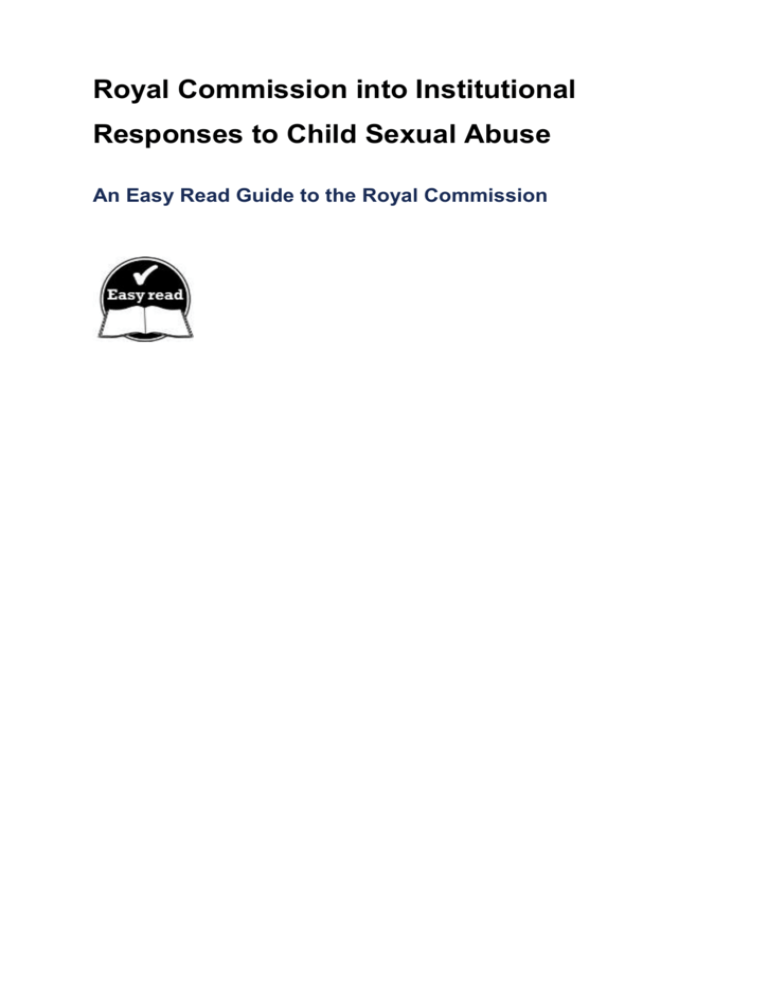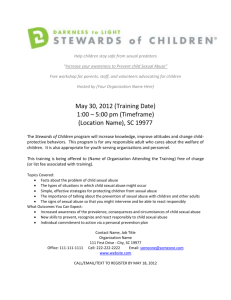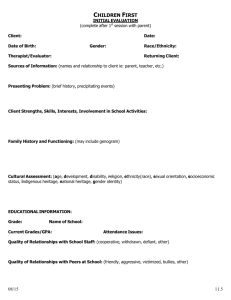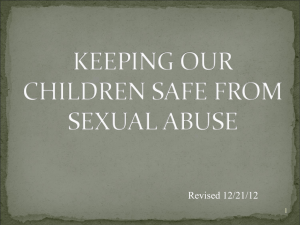
Royal Commission into Institutional
Responses to Child Sexual Abuse
An Easy Read Guide to the Royal Commission
What is in this document?
Page
number
About this document
3
What is child sexual abuse?
4
What are institutions?
6
What is a Royal Commission?
7
Who is a child?
8
Support for the Royal Commission
9
What the Commissioners have been asked to do
10
Supporting people to tell their story
10
Looking at institutions
10
How the Royal Commission will work
13
Making recommendations
13
Contact details
14
How to tell your story
14
What to do if you are worried about a child
14
Where you can get help right now
14
Word list
15
Page 2
About this document
This information is written in an easy to read way.
Some words are written in blue. We explain what these words mean. A
list of these words starts on page 15.
This guide is a summary of another document.
You can find the other document on our website at
www.childabuseroyalcommission.gov.au
A friend, family member or support person may be able to help you read
this document.
They may also be able to help you find and understand the bigger
document.
Page 3
What is child sexual abuse?
Sex is when two people choose to share their bodies.
It usually includes kissing, cuddling and touching private parts of the
body.
Many people enjoy sex as part of a relationship with another person,
such as a boyfriend or girlfriend, or their husband or wife.
If you are an adult and you choose to have sex with someone, that is ok.
That is your choice.
It’s not ok for adults to behave in a sexual way with children.
This is wrong.
This is called child sexual abuse.
Adults should never do things like:
have sex with children
try to have sex with children
touch children’s bodies in a sexual way
make children touch an adult’s body in a sexual way
take their clothes off and make children look at them
make children take their clothes off so adults can look at them
show children sexual pictures or videos.
All of these things are wrong.
In this document, a person who does things like this to someone else is
called an abuser.
And a person who has been abused is called a victim.
Page 4
Sexual abuse can happen to boys and girls. Abusers can be men or
women.
Child sexual abuse hurts children’s feelings. It can also hurt children’s
bodies.
Sexual abuse hurts children when they are young.
But it also has a long-term effect.
Child sexual abuse hurts people as they grow up to be adults.
And in many cases, it hurts people for the rest of their lives.
It also hurts families, friends and relatives.
Page 5
What are institutions?
We know that child sexual abuse has happened in places that care for
children.
In this document, we call these places institutions. These institutions
might include:
schools
religious organisations, such as churches, mosques and temples
sporting clubs
child-care centres or facilities
homes, foster care or respite care that is provided on behalf of an
organisation
other organisations in the community.
Institutions can be run by private businesses.
They may be run by religious organisations.
They may be run by the government, or for the government.
Page 6
What is a Royal Commission?
All children deserve a safe and happy childhood.
It is against the law to sexually abuse children.
The law is the set of rules that we must all follow.
We want to protect children from abuse.
We want to find out what happened in institutions in the past.
Then we can find ways to make sure this problem doesn’t happen in the
future.
To do this, we are setting up a Royal Commission.
A Royal Commission is an official way of looking into a big problem and
working out what went wrong.
A group of people will run the Royal Commission.
They are called the Commissioners.
This document explains what the Commissioners have been asked to
do.
Page 7
Who is a child?
Australia has signed the Convention on the Rights of the Child.
This is an agreement that describes the rights that children have.
Many countries around the world have signed this agreement.
In this agreement, a child is anyone who is under 18 years of age.
The Royal Commission will use this meaning of who is a child.
Page 8
Support for the Royal Commission
All of the governments in Australia agree that this Royal Commission is
very important.
All of the governments in Australia will support the work that the
Commissioners will do.
All of the governments in Australia believe that the Royal Commission
will help heal some of the hurt that has been caused by child sexual
abuse in institutions.
Page 9
What the Commissioners have been asked to do
The Commissioners have been asked to look into a range of issues.
They have been asked to look into what institutions are doing about
child sexual abuse.
The Commissioners will look into what happened in the past.
Then they will share their ideas about how to stop this problem from
happening in the future.
Supporting people to tell their story
It is important that people have a chance to tell their story.
Many victims will want to tell the Commissioners about the sexual abuse
that happened to them when they were children.
Some people are very upset about what happened to them.
Many people will need counselling and support when they tell their story.
The Commissioners have been asked to make sure that people get this
support.
Others will have special needs, such as needing help with
communication.
The Commissioners have been asked to make sure that people with
special needs are supported to tell their story.
Looking at institutions
The Commissioners have been asked to look at child sexual abuse that
has taken place in institutions.
The Commissioners will look at child sexual abuse by people who
worked at institutions.
Page 10
For example, the abuser may be:
a worker
a volunteer
a member of a club
someone who provides services to the institution
any other person who is connected to the institution.
The Commissioners will look at child sexual abuse that happened at an
institution, or in another place.
For example, the abuse might have happened while a worker was caring
for a child at the child’s home.
The Commissioners will look at all of the institutions where child sexual
abuse took place. This includes institutions that have closed down.
Importantly, cases where the abuser wasn’t part of an institution will not
be looked at.
The Commissioners will not look at child sexual abuse by people such
as a friend or family member.
If you are worried about child sexual abuse involving a friend or family
member, please see page 14 for information about who you can contact.
The Commissioners will focus on sexual abuse.
Sometimes, child sexual abuse happens along with other types of
abuse, such as:
hurting people’s bodies
making people do things they don’t want to do
not looking after someone properly
not giving someone what they need.
Page 11
The Commissioners will look at these types of abuse if they happen
along with sexual abuse.
The Commissioners will check whether institutions have done a good job
to stop child sexual abuse from happening.
They will ask whether institutions:
are aware that abuse can happen
know if abuse is happening
tell police or other authorities if abuse is happening
prevent abuse from happening again.
The Royal Commission will not deal with individual cases.
Individual cases will be dealt with in other ways.
For example, some cases might go to court.
The Commissioners have been asked to make sure that their inquiry
does not interfere with other legal processes, such as court cases.
Page 12
How the Royal Commission will work
One person will lead the Royal Commission.
His name is Justice Peter McClellan AM and he is called the Chair of the
Royal Commission.
The Commissioners will need plenty of time to look at all the evidence.
Many people and institutions will need time to gather documents and
information for the Commissioners to review.
This may take a while, especially if the information is from a long time
ago.
However, it’s important that the Royal Commission does not take too
long to complete.
The Commissioners have been asked to start the Royal Commission as
soon as possible.
They have been asked to finish their first report by 30 June 2014.
In the first report, the Commissioners will let the government know how
much time they need to complete the whole inquiry.
Making recommendations
The Commissioners have been asked to make recommendations
based on what they learn.
Recommendations are ideas about what can be done to fix a problem.
The recommendations may include changes to:
the law
government plans or policies
the way that institutions operate.
Page 13
Contact details
How to tell your story
If you have been a victim of child sexual abuse, you can contact the
Royal Commission.
Please phone 1800 099 340.
What to do if you are worried about a child
If you are worried that a child is being abused, please contact the police.
Where you can get help right now
If you need help right now, you can call Lifeline on 13 11 14.
You can call at any time, 24 hours a day.
There are also support services for victims in each state and territory.
Page 14
Word list
Abuser
A person who hurts someone else.
Child
The Royal Commission will use the meaning of the word child in the
Convention on the Rights of the Child. This is explained on page 8.
Child sexual abuse
When an adult behaves in a sexual way with a child. Child sexual abuse
is wrong.
Commissioner
A member of the group of people who will run the Royal Commission.
Institution
An organisation, such as a business, club, school or religious
organisation. Examples of the types of institutions included in the Royal
Commission are listed on page 6.
Law
The set of rules that we all must follow.
Recommendations
Ideas about what can be done to fix a problem.
Page 15
Royal Commission
An official way of looking into a big problem and working out what went
wrong.
Sex
When people choose to share their bodies. This is explained in more
detail on page 4.
Victim
Someone who has been hurt or abused.
Page 16








